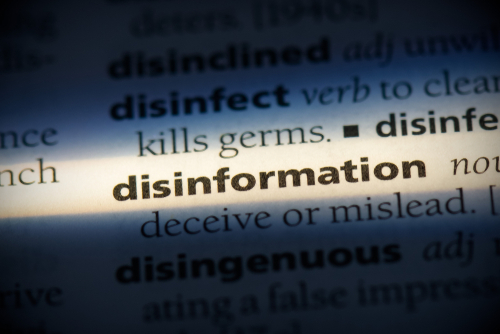Russian disinformation campaigns threaten trust in the court system, panelists say

Image from Shutterstock.
Public confidence in the courts is at risk because of Russian disinformation campaigns, panelists said at a symposium at the National Judicial College on Thursday.
Russian trolls are already spreading false information about the judicial system on social media, panelists said. They cited a report by the Center for Strategic and International Studies that found that courts are particularly vulnerable.
Law360 and Law.com covered the panelists’ remarks and the report findings.
The report found that Russian-backed operatives are seeking to worsen divisions in American, partly by portraying justice systems as corrupt, inept and hypocritical. These four themes are used:
• The justice system protects and covers up crimes committed by immigrants.
• The justice system supports a racist and corrupt police state.
• The justice system enables corporate corruption.
• The justice system is a tool of the political elite.
Elizabeth Rindskopf Parker, a senior consultant at the CSIS and a former dean of the Pacific McGeorge School of Law, showed slides of Russian disinformation posts on social media.
Russian trolls posed variously as supporters of Black Lives Matter and the police. Trolls also remarked on the murder trial of an immigrant in the country illegally who was accused of the shooting death of Kate Steinle in 2015. Jurors concluded that the shooting was an accident.
Anti-immigrant tweets by Russian-linked accounts followed, according to Law.com’s panel coverage. One Russian Twitter account said the verdict “uncovered the corruption of the criminal justice system, with jurors kept ignorant by activist judges and complicit liberal lawyers.”
Arizona Supreme Court Chief Justice Robert M. Brutinel formed a task force to study how to address the issue. Among the task force recommendations:
• Redesign the court’s interactive civics program and expand community outreach by the judicial branch.
• Establish court contacts to help the public and the media understand the role and function of the courts. Also establish court websites and social media accounts to provide information.
• Establish a rapid-response team to address disinformation targeting the judicial branch.
• Modify the Arizona Code of Judicial Conduct to allow judges to respond to attacks on their actions, character or reputation. That recommendation was adopted when Arizona adopted rules to allow judges to respond to false, misleading or unsubstantiated allegations.



